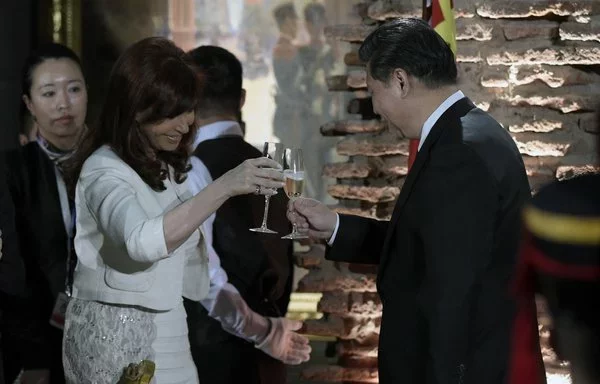Diplomacy
Upcoming conference in Argentina highlights concerns over China in Latin America
Beijing is moving from soft to coercive tactics in exerting its will over Latin America, say observers, and the upcoming defense conference in Mendoza will likely address such concerns.
![Argentine Foreign Minister Diana Mondino visited China in April to confer with Chinese Foreign Minister Wang Yi on crucial elements of the political and economic relationship between their countries. [Argentine Foreign Ministry]](/gc4/images/2024/10/03/47771-mondino1-600_384.webp)
By Analía Rojas |
BUENOS AIRES -- The XVI Conference of Defense Ministers of the Americas, scheduled for October 13-16 in Mendoza, Argentina, comes amid rising concerns over transnational conflicts in Ukraine and the Middle East and China's expanding influence in Latin America.
While the agenda for the event covers topics like organized crime, cyber defense and humanitarian assistance, underlying concerns persist about China's growing influence in key sectors like education and technology.
China's "soft power" initiatives are increasingly viewed as a complex threat to the sovereignty of Latin American nations.
Institutions like the Confucius Institutes, the China-LAC Cooperation Fund, the Belt and Road Initiative (BRI) and the China-Brazil Innovation Center have been scrutinized.

Originally established to promote Chinese language and culture, Confucius Institutes have come under fire in the United States and Europe for advancing Chinese Communist Party propaganda and enabling industrial espionage.
In contrast, these institutions have operated in Latin America without sparking significant public debate.
Researcher Marcos Falcone of the Fundación Libertad references a study from the University of the Republic of Uruguay in his book China in Latin America: The Other Side of the Coin (2024).
"It is clear that Confucius Institutes pursue objectives aligned with China's foreign policy," Falcone concluded.
"Chinese culture and language are presented through the lens of communist ideology and leadership," he said.
Academics Nahir Miner and Karen Gómez conducted research for "Chinese Soft Power in Argentina Through the Confucius Institutes," published in the July-December edition of the Journal of Integration and International Cooperation at the National University of Rosario in Argentina.
Their research found that Confucius Institutes not only promote the Chinese language and culture but enable the Chinese regime to exert political influence.
In Argentina, Confucius Institutes at universities like Buenos Aires, the National University of La Plata and the National University of Córdoba have bolstered academic connections. However, they have sparked concerns regarding their underlying objectives, particularly amid current geopolitical tensions.
Both researchers contend that while the increasing Chinese influence is officially aimed at enhancing relations with host countries, it may be concealing a strategy for control that raises concerns about sovereignty and academic freedom.
Reality vs. rhetoric
Although Javier Milei's government has taken a resolute stance against communism and Chinese influence, Argentina's economic challenges have complicated efforts to achieve meaningful decoupling from China.
Two decades of economic dependence on China has significantly impacted Argentina, stemming from prior agreements that facilitated Chinese investments in critical sectors like energy, transportation and lithium extraction, among others.
Projects like the hydroelectric dams in Santa Cruz, which are 85% financed by Chinese capital and expected to supply 3% of Argentine energy, exemplify this growing influence.
The meeting between Argentine Foreign Minister Diana Mondino and Chinese Foreign Minister Wang Yi in New York on September 25 underscored this contradiction.
Despite the Milei government's tough rhetoric, Mondino emphasized the significance of trade with Beijing and expressed openness to new Chinese investments.
This situation underscores Argentina's predicament: it might reject the Chinese political model, but pressing economic needs compel cooperation.